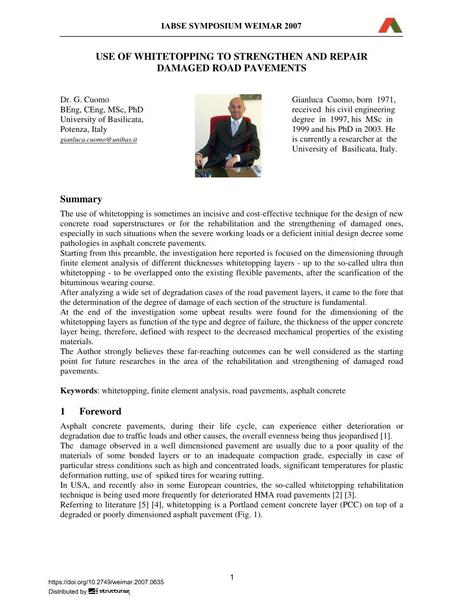Use of whitetopping to strenghten and repair damaged road pavements

|
|
|||||||||||
Bibliographic Details
| Author(s): |
Gianluca Cuomo
|
||||
|---|---|---|---|---|---|
| Medium: | conference paper | ||||
| Language(s): | English | ||||
| Conference: | IABSE Symposium: Improving Infrastructure Worldwide, Weimar, Germany, 19-21 September 2007 | ||||
| Published in: | IABSE Symposium Weimar 2007 | ||||
|
|||||
| Page(s): | 464-465 | ||||
| Total no. of pages: | 8 | ||||
| Year: | 2007 | ||||
| DOI: | 10.2749/weimar.2007.0635 | ||||
| Abstract: |
The use of whitetopping is sometimes an incisive and cost-effective technique for the design of new concrete road superstructures or for the rehabilitation and the strengthening of damaged ones, especially in such situations when the severe working loads or a deficient initial design decree some pathologies in asphalt concrete pavements. Starting from this preamble, the investigation here reported is focused on the dimensioning through finite element analysis of different thicknesses whitetopping layers - up to the so-called ultra thin whitetopping - to be overlapped onto the existing flexible pavements, after the scarification of the bituminous wearing course. After analyzing a wide set of degradation cases of the road pavement layers, it came to the fore that the determination of the degree of damage of each section of the structure is fundamental. At the end of the investigation some upbeat results were found for the dimensioning of the whitetopping layers as function of the type and degree of failure, the thickness of the upper concrete layer being, therefore, defined with respect to the decreased mechanical properties of the existing materials. The Author strongly believes these far-reaching outcomes can be well considered as the starting point for future researches in the area of the rehabilitation and strengthening of damaged road pavements. |
||||
| Keywords: |
finite element analysis FEA whitetopping road pavements asphalt concrete
|
||||
